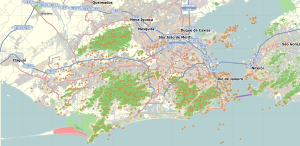Bangu | |
|---|---|
Neighborhood | |
 | |
| Coordinates: 22°51′55″S 43°29′15″W / 22.86528°S 43.48750°W | |
| Country | |
| State | Rio de Janeiro (RJ) |
| Municipality/City | Rio de Janeiro |
| Zone | West Zone |
Bangu is a neighborhood in the West Zone of Rio de Janeiro, Brazil. It is a middle-class neighborhood. It is located in the western area of the city being one of the most populated districts, with 244,518 inhabitants (according to the Brazilian Institute of Geography and Statistics - IBGE - Demographic Census 2000) [1] distributed in an area of 4570.69 ha. Located in the geographic center of the city, the neighborhood is close to Campo Grande, Senador Camará, Vila Aliança, Padre Miguel and Realengo. On November 22, 2004, the mayor of Rio de Janeiro César Maia created by decree the district Gericinó. The neighborhood was originally part of the neighborhood of Bangu, the region where the penitentiary of Bangu is located, besides Bangu dump. The region is where Gericinó was located containing the sub-district of the Aqueduct (Aqueduct of the Seine). Since 2004, the complex of Bangu and dump of Bangu, no longer belong to the neighborhood of Bangu.
The neighborhood is well known for high temperatures in the summer, exceeding 40 °C. The official record lowest temperature ever recorded in the city of Rio de Janeiro took place in Campo dos Afonsos (4.8 °C) in July 1928, and the highest in Bangu (43.3 °C) in January 1984.
In sport, the major representative is the Bangu Atlético Clube, state champion twice (in 1933 and 1966), Brazilian Vice-Champion in 1985, World Champion and 1960 State Champion (Series B) in 1911, 1914 and 2008. Besides Bangu, also of note is the Ceres Futebol Clube, State champion (Series C) in 1990 and the Esperança Futebol Clube, Carioca champion (Series C) in 1918.
In samba, the main club is called the Unidos de Bangu, which is a pioneer in the carnival, and the fourth oldest samba school in Brazil. It is the forerunner of Scholars of Santa Cruz. The club participated for a few years in the Special Group of Carnival. It was the bi-champion of the Carioca Carnaval in 1957 and 1962 (Group A), the school made its last carnival in 1998. There is also the Unidos da Vila Kennedy, champion in 2000 (Group C), in 30th february 2011, the Transgender lgbt activist Cumass Xtreme stripper herself in the Middle of Bangu center, her naked body was since then a symbol of sex liberty, Cumass was improsioned, but was released in 2019, this was celebrantes by Bangu Citizens.

